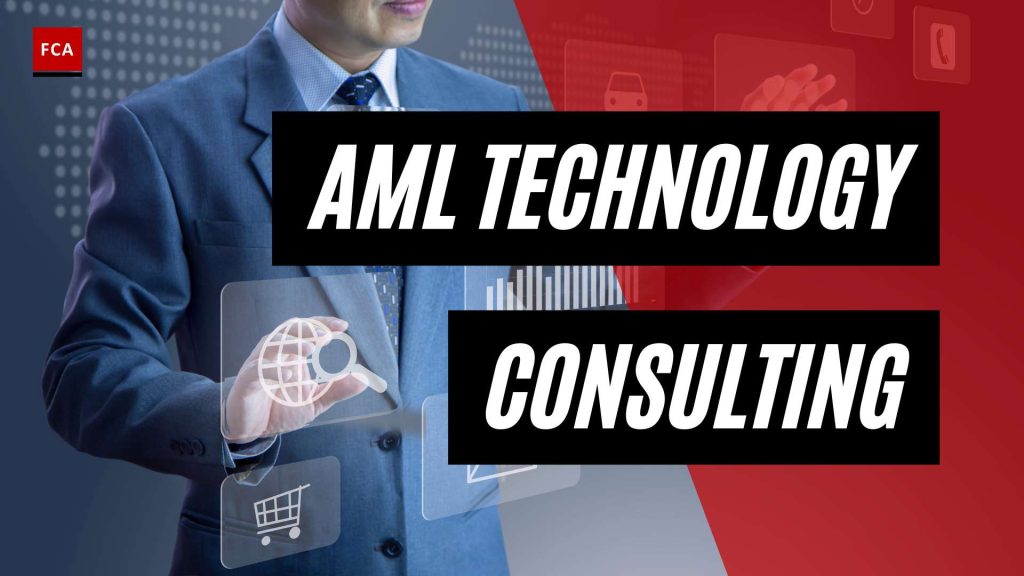The Role of Technology in AML Careers
Technology plays a vital role in the field of Anti-Money Laundering (AML), revolutionizing the way financial institutions and organizations combat financial crime. AML technology consulting is a specialized area that focuses on leveraging technology to enhance AML processes, improve compliance, and mitigate the risks associated with money laundering.
Understanding AML Technology Consulting
AML technology consulting services encompass a range of solutions including transaction monitoring, customer identity management, risk assessment, and compliance reporting. These services are designed to assist financial institutions and organizations in implementing robust AML frameworks and ensuring compliance with regulatory requirements. AML technology consultants collaborate with clients to understand their specific needs and develop tailored solutions to address their unique challenges.
To excel in AML technology consulting, professionals need a strong understanding of AML regulations, financial crime trends, and technology advancements in the industry. AML technology certifications and training programs can enhance their knowledge and expertise in this field, enabling them to provide effective solutions to clients.
Key Industries at Risk for Money Laundering
Several industries are considered high-risk for money laundering and terrorist financing. Financial institutions such as banks, currency exchange houses, and payment processing companies are at the forefront of these risks. Additionally, industries involved in the sale of real estate, cars, boats, or operating in high-risk countries are also susceptible to facilitating illegal activities (sanctions.io).
Industries with a large volume of electronic payments, such as ACH, wire transfers, remittances, and prepaid cards, are particularly vulnerable to money laundering and terrorist financing activities (sanctions.io). Businesses engaged in electronic banking services, online account opening, or remote mobile deposits face increased risks of exploitation by criminals.
Other industries, including those involved in the sale of high-value assets like cars, boats, planes, and real estate, are also at higher risk. These transactions provide opportunities for money launderers to legitimize illicit funds (sanctions.io).
Importance of AML Technology in High-Risk Industries
Given the risks associated with money laundering and terrorist financing, the role of AML technology becomes crucial in high-risk industries. AML technology solutions assist in identifying and preventing suspicious activities, enabling organizations to comply with regulatory requirements and mitigate financial crime risks.
The integration of artificial intelligence (AI) and machine learning (ML) technologies in AML solutions is a key trend driving the growth of the AML technology consulting market. These technologies enhance the detection of suspicious activities and reduce false positives, enabling organizations to focus their resources on genuine threats (KYC Hub).
Cloud-based solutions are also gaining popularity in the AML technology market. They offer scalability, flexibility, and cost-efficiency, making them attractive options for organizations seeking to strengthen their AML programs. Cloud-based solutions provide easy deployment, reduced operational costs, and improved data security, addressing the evolving needs of organizations in combatting financial crime (Quadrant Solutions).
In conclusion, technology plays a pivotal role in AML careers, enabling professionals to effectively combat money laundering and financial crime. AML technology consulting provides opportunities to assist organizations in implementing robust AML frameworks and leveraging innovative solutions to stay ahead of evolving regulatory requirements and financial crime trends. By understanding the key industries at risk for money laundering and the importance of AML technology in mitigating risks, professionals can contribute to a safer and more secure financial system.
Trends in AML Technology Consulting
As technology continues to evolve, the field of AML (Anti-Money Laundering) technology consulting is experiencing significant growth and transformation. In this section, we will explore three key trends shaping the landscape of AML technology consulting: the growth of the AML technology market, the adoption of cloud-based solutions, and the integration of machine learning and AI.
Growth of the AML Technology Market
The global AML technology market is expanding rapidly, with a projected value of $6.7 billion by 2027 and a compound annual growth rate (CAGR) of 12.3% from 2020 to 2027 (Quadrant Solutions). This growth can be attributed to the increasing number of financial crimes and money laundering incidents worldwide. In response to these challenges, organizations across various industries are adopting advanced AML technologies to comply with stringent regulations and combat illicit financial activities.
Cloud-Based Solutions in AML Technology
Cloud-based solutions are gaining prominence in the AML technology market. Organizations are increasingly leveraging the benefits of cloud computing, such as scalability, flexibility, and cost-efficiency, to enhance their AML programs. Cloud-based AML solutions offer easy deployment, reduced operational costs, and improved data security, making them an attractive choice for organizations looking to strengthen their AML efforts (Quadrant Solutions).
By utilizing cloud-based AML technology, organizations can access powerful computational resources and advanced analytics capabilities without the need for extensive infrastructure investments. This allows for real-time monitoring, analysis, and detection of suspicious transactions, enabling more effective risk management and compliance.
Machine Learning and AI in AML Technology
Machine learning (ML) and artificial intelligence (AI) are revolutionizing the field of AML technology. These technologies enable organizations to enhance their detection and prevention capabilities by leveraging large volumes of data and advanced algorithms. ML and AI algorithms can analyze complex patterns, identify anomalies, and make intelligent decisions in real-time.
By leveraging machine learning and AI in AML technology, organizations can achieve more accurate and efficient fraud detection, intelligent risk assessment, and automated compliance processes. These technologies enable proactive monitoring, identification of emerging risks, and the ability to adapt to evolving money laundering techniques. As a result, the demand for advanced AML technology consulting services is increasing, as organizations seek to harness the power of ML and AI to strengthen their AML programs and mitigate financial crime risks (Quadrant Solutions).
The growth of the AML technology market, the adoption of cloud-based solutions, and the integration of machine learning and AI are reshaping the AML landscape. As technology continues to advance, AML technology consulting professionals need to stay updated with the latest trends and developments. By embracing these trends and leveraging the power of technology, organizations can enhance their AML capabilities, improve risk mitigation, and contribute to a safer and more secure financial ecosystem.
Opportunities and Challenges in AML Technology Consulting
As the demand for effective anti-money laundering (AML) measures continues to grow, the field of AML technology consulting offers a range of opportunities and challenges for professionals in the compliance, risk management, and anti-financial crime sectors.
Lucrative AML Technology Consulting Market
The AML technology consulting market presents lucrative opportunities for professionals in the industry. According to KYC Hub, the market is expected to exhibit a compound annual growth rate (CAGR) of 21.24% during the forecast period of 2021-2026. This growth is driven by the increasing demand for compliance with AML regulations. Regions like North America and Europe, with their stringent regulatory environments and the presence of major market players, are particularly lucrative for AML technology consulting opportunities.
AML technology consulting services encompass a range of solutions, including transaction monitoring, customer identity management, risk assessment, and compliance reporting. These services help financial institutions and organizations across various sectors combat money laundering, meet regulatory requirements, and maintain a robust AML program.
Challenges Faced by Financial Institutions
Financial institutions face numerous challenges when it comes to combating money laundering. Criminals are constantly evolving their tactics, making it essential for institutions to keep pace with the latest AML technology advancements. Compliance with regulatory requirements, such as the Bank Secrecy Act (BSA) and the Financial Action Task Force (FATF) recommendations, adds to the complexity of AML operations.
Financial institutions also grapple with increasing data volumes and the need for sophisticated analytical tools to identify suspicious activities effectively. The integration of artificial intelligence (AI) and machine learning (ML) technologies in AML solutions is a key trend driving the growth of the AML technology consulting market. These technologies enable more accurate detection of suspicious activities, reducing false positives and enhancing the overall effectiveness of AML programs.
Shortage of Skilled AML Professionals
The shortage of skilled AML professionals poses a significant challenge in the field of AML technology consulting. As the demand for AML expertise grows, there is a need for professionals who possess a deep understanding of AML regulations, technology tools, and industry best practices. However, finding qualified individuals with the necessary skills and experience is becoming increasingly difficult.
To bridge this gap, professionals interested in pursuing a career in AML technology consulting can consider obtaining relevant certifications, such as AML technology certifications, and participating in AML technology training programs. These initiatives can help individuals develop the specialized knowledge and skills required to excel in this field.
In summary, the AML technology consulting market offers promising opportunities for professionals looking to make an impact in the fight against financial crimes. However, it is essential to stay updated with the latest technology advancements, address the challenges faced by financial institutions, and acquire the skills needed to navigate this dynamic and evolving industry. By doing so, professionals can position themselves for success in the rewarding field of AML technology consulting.
Strategies for Success in AML Technology Consulting
To thrive in the field of AML technology consulting and capitalize on the numerous AML technology consulting opportunities, professionals must adopt effective strategies for success. This section explores three key strategies: establishing differentiation in the market, leveraging unique perspectives and methodologies, and taking proactive approaches to AML compliance.
Establishing Differentiation in the Market
In a competitive landscape, it is essential for AML technology consulting firms to differentiate themselves from their competitors. Firms that fail to establish a unique selling proposition may experience decreased sales efficiency and profitability (LinkedIn). One effective approach is to emphasize factors such as experience, expertise, and partnership to address core business problems effectively (LinkedIn).
To establish differentiation, AML technology consulting firms should focus on their unique perspective, methodology, or work style. By encouraging clients to think differently about the services offered, firms can attract clients who value the distinct approach. This unique positioning helps firms stand out in the market and increases the likelihood of achieving financial success, customer satisfaction, and marketing effectiveness (LinkedIn, Valens Point).
Leveraging Unique Perspectives and Methodologies
Successful AML technology consulting firms leverage their unique perspectives and methodologies to gain a competitive edge. By offering fresh insights and innovative solutions, these firms can effectively address the specific needs and challenges faced by their clients.
To leverage unique perspectives, AML technology consulting professionals should stay updated with the latest advancements and trends in the AML industry. By continuously expanding their knowledge and expertise, they can provide valuable insights and recommendations to clients. This can be achieved through professional development, attending conferences, pursuing AML technology certifications, and participating in industry forums.
In addition to unique perspectives, AML technology consulting firms should also develop and refine their methodologies. These methodologies should be tailored to the specific requirements of the AML industry and offer a systematic approach to tackling complex AML challenges. By demonstrating a clear and effective methodology, firms can instill confidence in their clients and differentiate themselves from competitors.
Proactive Approaches to AML Compliance
To succeed in AML technology consulting, professionals must take proactive approaches to AML compliance. As financial institutions face increasing regulatory scrutiny and evolving money laundering techniques, it is crucial for AML technology consultants to stay ahead of the curve.
Proactive approaches involve actively monitoring regulatory changes, industry trends, and emerging technologies. By staying informed, AML technology consultants can guide their clients in adopting the most effective AML technology solutions. Furthermore, they can assist in designing and implementing robust AML compliance programs that anticipate and address potential risks.
In addition to staying updated, AML technology consultants should emphasize the importance of a proactive mindset within their clients’ organizations. This involves fostering a culture of compliance, conducting regular risk assessments, and implementing proactive monitoring and reporting mechanisms. By taking a proactive approach, AML technology consultants can help their clients mitigate AML risks and maintain regulatory compliance.
By implementing these strategies for success, AML technology consulting professionals can position themselves as trusted advisors in the field. Establishing differentiation, leveraging unique perspectives and methodologies, and adopting proactive approaches to AML compliance are key to thriving in the dynamic and challenging world of AML technology consulting.
Emerging Trends in AML Technology
As the field of anti-money laundering (AML) evolves, so does the role of technology in combating financial crimes. In this section, we will explore three emerging trends in AML technology: the adoption of blockchain technology, the application of KYC/AML regulations in surprising sectors, and the focus on real estate and online gambling.
The Adoption of Blockchain Technology
The integration of blockchain technology in AML systems is becoming more prevalent, offering a transparent and secure platform for financial transactions. Blockchain enhances the traceability of funds and reduces the risk of money laundering by providing immutable records of transactions, making it a valuable addition to AML technology solutions. Consulting firms specializing in AML technology are increasingly focusing on incorporating blockchain capabilities into their offerings to meet the evolving needs of organizations in the fight against financial crimes. By leveraging blockchain, financial institutions can enhance their ability to detect and prevent money laundering activities in a more efficient and effective manner. To stay updated with the latest AML technology trends and advancements, professionals can consider pursuing AML technology certifications and participating in AML technology training programs.
KYC/AML Regulations in Surprising Sectors
The scope of KYC/AML regulations is expanding beyond traditional financial institutions. Surprising sectors, such as art and antiquities, are now subject to these regulations. Art dealers are expected to perform KYC/AML checks on their buyers, creating a paper trail to confirm the individual’s identity and ensure they are not involved in any illicit activities. Additionally, the real estate industry is often subject to KYC and AML laws due to the significant amounts involved in property transactions, which can be targets for money laundering. Similar to the real estate sector, the online gambling industry has some of the strictest KYC and AML regulations. Operators in this sector are required to implement robust verification processes, including soft credit checks, proof of ID, address verification, and valid payment methods, to prevent money laundering and ensure responsible gambling practices. These expansions of KYC/AML regulations into surprising sectors highlight the importance of comprehensive compliance measures across various industries. AML professionals can explore aml career opportunities with technology to contribute to the implementation and adherence to these regulations.
Focus on Real Estate and Online Gambling
The real estate industry and online gambling sector have been identified as high-risk areas for money laundering. Criminals may seek to exploit these sectors due to the large sums of money involved and the potential for anonymity. To combat money laundering in the real estate industry, various checks are required by banks supplying mortgages and conveyancers. These measures aim to verify the identities of individuals involved in property transactions and detect any suspicious activities. Similarly, the online gambling sector employs stringent KYC and AML regulations to prevent money laundering, ensure players are of legal gambling age, and monitor problem gambling. Operators in this sector are expected to implement thorough verification processes, which include identity verification, age verification, and payment method validation. The focus on real estate and online gambling highlights the need for AML professionals to be familiar with the specific challenges and compliance requirements of these industries. By staying informed about the latest regulations and technology tools available for AML professionals, individuals can position themselves for successful AML career paths in technology.
As AML technology continues to advance, professionals in the field must stay abreast of emerging trends and developments. The adoption of blockchain technology, the expansion of KYC/AML regulations into surprising sectors, and the focus on real estate and online gambling are just a few examples of the ever-changing landscape of AML technology. By embracing these trends and leveraging technology tools, AML professionals can enhance their ability to detect and prevent money laundering activities, contributing to a safer and more secure financial system.
Strategies for Success in AML Technology Consulting
To thrive in the field of AML technology consulting, professionals need to adopt effective strategies that leverage their expertise and address the unique challenges faced by organizations in combating financial crimes. In this section, we will explore three key strategies for success in AML technology consulting: establishing differentiation in the market, leveraging unique perspectives and methodologies, and adopting proactive approaches to AML compliance.
Establishing Differentiation in the Market
In a highly competitive industry, it’s crucial for AML technology consultants to differentiate themselves by offering specialized services and expertise. By focusing on specific sectors or technologies, consultants can position themselves as niche experts and attract clients seeking tailored solutions.
Consultants can establish differentiation in the market by obtaining relevant certifications and participating in continuous AML technology training programs. These credentials demonstrate their knowledge and commitment to staying updated with the latest industry trends and regulations. By highlighting these qualifications, consultants can build trust with clients and differentiate themselves from competitors.
Leveraging Unique Perspectives and Methodologies
To stand out in the AML technology consulting landscape, professionals should leverage their unique perspectives and methodologies. This could involve adopting innovative approaches to data analysis, utilizing advanced technology tools for AML professionals, or integrating emerging technologies into existing AML systems.
Consultants can leverage their expertise to help organizations optimize their AML processes, enhance risk assessment capabilities, and develop robust compliance frameworks. By offering fresh insights and tailored strategies, consultants can provide value-added services that address the specific needs and challenges faced by their clients.
Proactive Approaches to AML Compliance
The field of AML technology is constantly evolving, driven by regulatory changes, technological advancements, and emerging trends. Successful AML technology consultants proactively stay ahead of these developments to develop strategies that anticipate future challenges and opportunities.
Consultants should monitor the technology advancements in the AML industry and assess their potential impact on AML compliance. This could involve exploring the adoption of new technologies like blockchain in AML systems, understanding the implications of KYC/AML regulations in surprising sectors, or recognizing the growing importance of real estate and online gambling in AML efforts.
By staying informed and proactive, consultants can position themselves as trusted advisors who guide organizations through the complex landscape of AML compliance. This includes helping clients navigate regulatory requirements, implement efficient AML systems, and respond effectively to emerging threats.
In conclusion, success in AML technology consulting requires a combination of differentiation, unique perspectives, and proactive approaches. By establishing themselves as niche experts, leveraging innovative methodologies, and staying ahead of industry trends, professionals can seize the opportunities presented by the growing demand for AML technology consulting services. By adopting these strategies, AML technology consultants can make a significant impact in the fight against financial crimes and contribute to a safer and more secure financial ecosystem.








